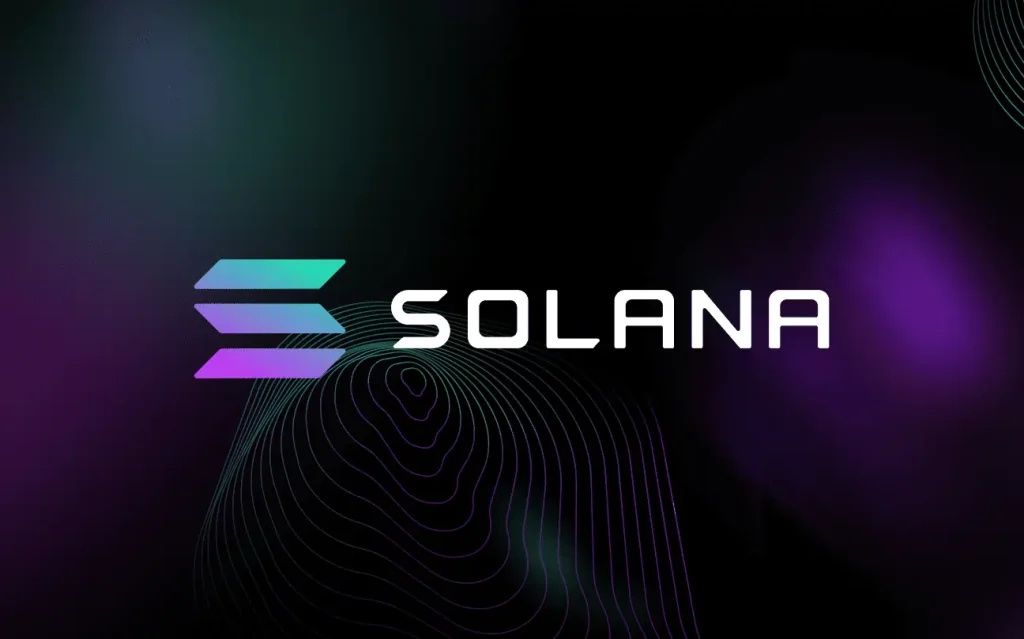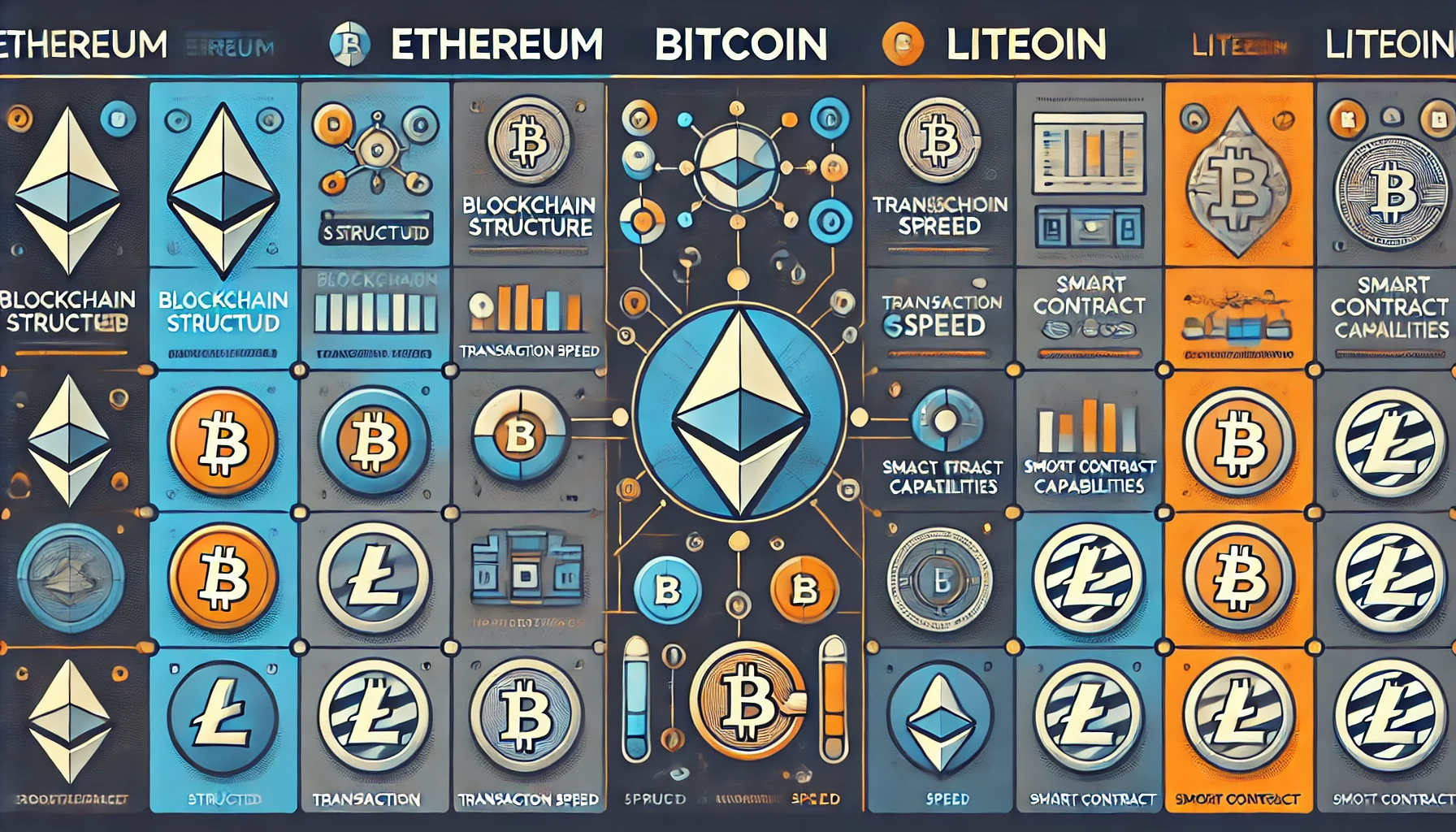This review compares Ethereum to other major cryptocurrencies, focusing on their unique features, consensus mechanisms, and overall performance. Ethereum, known for its smart contract capabilities and decentralized applications (DApps), has gained immense popularity. This analysis aims to highlight its strengths and weaknesses compared to Bitcoin, Ripple (XRP), and Solana.
Overview
Ethereum

Ethereum is a decentralized platform that enables smart contracts and DApps to be built and operated without downtime, fraud, or interference. It uses Ether (ETH) as its native cryptocurrency to power transactions and interactions on the network. Ethereum initially employed a Proof of Work (PoW) consensus mechanism but has transitioned to Proof of Stake (PoS) with Ethereum 2.0 to improve scalability and sustainability.
Bitcoin

Bitcoin, the first cryptocurrency, serves as a digital store of value and medium of exchange. It operates on a PoW consensus mechanism, ensuring security and decentralization. Bitcoin’s blockchain processes transactions relatively slowly, averaging 10 minutes per block.
Ripple (XRP)

Ripple focuses on facilitating cross-border payments efficiently. It uses a unique consensus mechanism called Ripple Protocol Consensus Algorithm (RPCA) rather than PoW or PoS. This approach allows faster transaction processing but at the cost of greater centralization.
Solana

Solana is known for its high transaction speed and low costs, making it a strong competitor in the DeFi space. It uses a combination of PoS and Proof of History (PoH) to achieve consensus, enabling it to process thousands of transactions per second.
Pros and Cons
Below is a table summarizing the pros and cons of Ethereum compared to other cryptocurrencies:
| Cryptocurrency | Pros | Cons |
|---|---|---|
| Ethereum | Supports smart contracts and DApps, transition to PoS enhances scalability and sustainability | High transaction fees, network congestion |
| Bitcoin | Most secure and decentralized, widely recognized and adopted | Slow transaction speeds, high energy consumption |
| Ripple (XRP) | Fast and low-cost transactions, strong focus on cross-border payments | More centralized, regulatory challenges |
| Solana | Extremely fast and low-cost transactions, strong DeFi and NFT ecosystem | Less mature network, occasional network outages |
Pros
Ethereum: Ethereum excels in supporting smart contracts and DApps, making it a versatile platform. The transition to PoS aims to improve scalability and reduce energy consumption, addressing some of the network’s major issues.
Bitcoin: Bitcoin is the gold standard in cryptocurrency, known for its security and decentralization. Its broad recognition and adoption make it a reliable store of value.
Ripple (XRP): Ripple’s main advantage is its fast and low-cost transactions, ideal for cross-border payments. Its consensus mechanism allows quick processing, making it efficient for institutional use.
Solana: Solana boasts extremely fast transaction speeds and low costs, positioning it well within the DeFi and NFT markets. Its innovative consensus mechanism supports high throughput, making it attractive for developers.
Cons
Ethereum: Despite its strengths, Ethereum faces high transaction fees and network congestion. These issues have driven some users to seek alternatives.
Bitcoin: Bitcoin’s slow transaction speeds and high energy consumption are significant drawbacks, especially as the network grows. Its PoW mechanism is secure but resource-intensive.
Ripple (XRP): Ripple’s more centralized approach has raised concerns within the cryptocurrency community. Additionally, it faces ongoing regulatory challenges that could impact its adoption and growth).
Solana: Solana’s network, though fast, is less mature and has experienced outages. These reliability issues could pose risks to its long-term success.
In-Depth Analysis
Design
Ethereum: Ethereum’s design supports smart contracts and DApps, enabling a wide range of decentralized applications. Its transition to PoS aims to improve scalability and sustainability.
Functionality
Ethereum offers extensive functionality through its smart contract platform. It supports a variety of applications, including DeFi, NFTs, and DAOs, making it a versatile blockchain for developers.
Durability
Ethereum has shown resilience through its network upgrades and ability to adapt. The transition to PoS with Ethereum 2.0 is a significant step towards ensuring its long-term sustainability and scalability.
User Experience
Users appreciate Ethereum for its broad application support and active development community. However, high transaction fees and occasional congestion can impact the user experience negatively.
Value for Money
While Ethereum’s transaction fees are high, its value proposition lies in its versatility and extensive application support. The transition to PoS is expected to reduce fees and improve overall network efficiency.
Comparison
When comparing Ethereum to other cryptocurrencies:
- Bitcoin: Serves as a digital store of value and medium of exchange, but lacks Ethereum’s smart contract functionality.
- Ripple (XRP): Focuses on cross-border payments with faster, cheaper transactions but is more centralized.
- Solana: Offers high-speed, low-cost transactions, ideal for DeFi and NFTs, but has less network maturity and reliability issues.
Table of Comparison
| Feature | Ethereum | Bitcoin | Ripple (XRP) | Solana |
|---|---|---|---|---|
| Consensus Mechanism | PoS | PoW | RPCA | PoS/PoH |
| Transaction Speed | 15-30 TPS | 4.6 TPS | 1,500 TPS | 50,000+ TPS |
| Transaction Fees | High | Moderate | Low | Low |
| Smart Contracts | Yes | No | No | Yes |
| Decentralization | High | High | Moderate | Moderate |
FAQ
What makes Ethereum’s consensus mechanism unique?
Ethereum’s transition to PoS reduces energy consumption and increases scalability, enhancing the network’s efficiency.
How does Ethereum compare to Bitcoin in terms of transaction speed?
Ethereum processes transactions faster than Bitcoin, with blocks added approximately every 15 seconds compared to Bitcoin’s 10 minutes.
Is Ripple (XRP) more centralized than Ethereum?
Yes, Ripple’s consensus mechanism involves fewer validators, making it more centralized compared to Ethereum’s decentralized network.
Conclusion
Ethereum stands out for its smart contract capabilities and extensive application support. While it faces challenges like high transaction fees, its ongoing transition to PoS aims to address these issues. Compared to Bitcoin’s secure store of value and Ripple’s efficient payment system, Ethereum offers a versatile platform for decentralized applications. Solana’s high-speed transactions make it a strong competitor in the DeFi space. Each cryptocurrency has its unique strengths, making them suitable for different use cases.
Rating
- Ethereum: ★★★★☆ (4.5/5)
- Bitcoin: ★★★★☆ (4/5)
- Ripple (XRP): ★★★☆☆ (3.5/5)
- Solana: ★★★★☆ (4/5)

